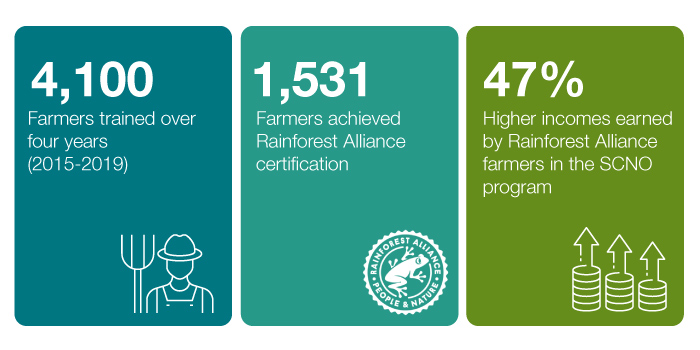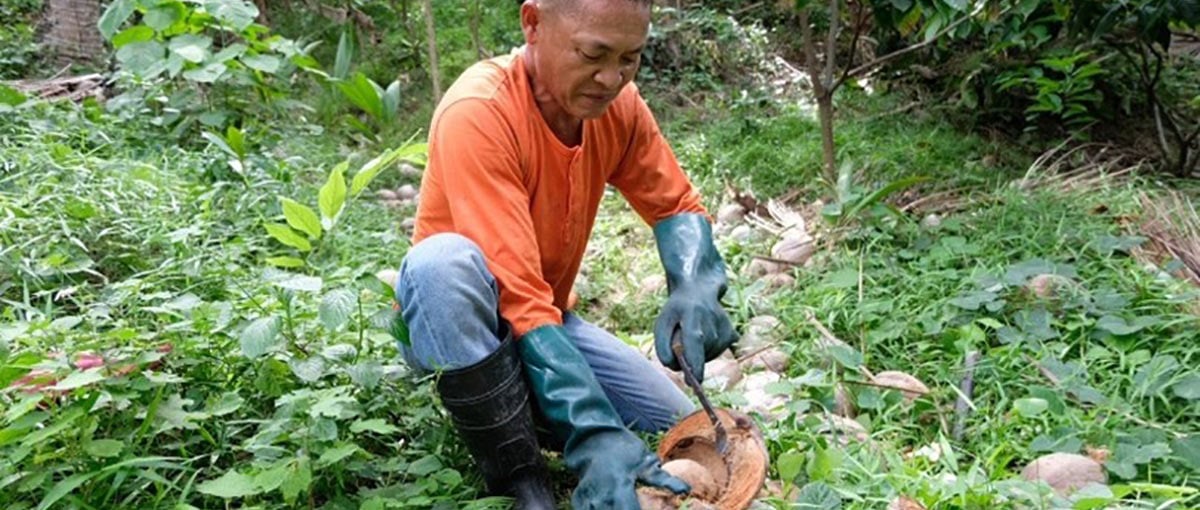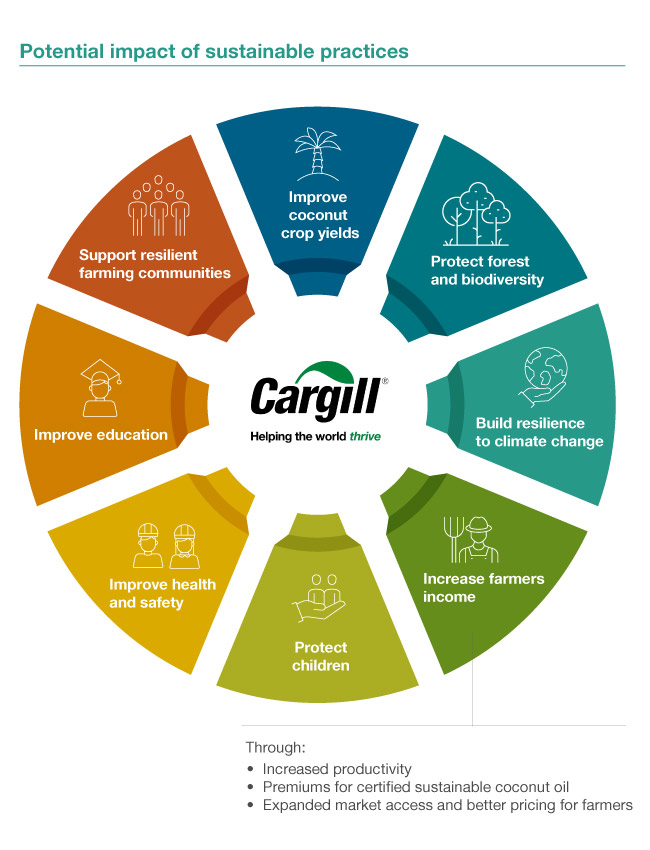Our Actions
Promoting environmentally sustainable and socially responsible practices
We work with farmers and other partners to improve the sustainability of coconut oil production in Indonesia and the Philippines – the world’s largest coconut producing countries.
Improving agricultural practices in the Philippines
In 2021, Cargill and six other global companies – Barry Callebaut, Jacobs Douwe Egberts, Nestlé, Procter & Gamble, Royal FrieslandCampina and Unilever – launched a four-year public-private partnership with the German development organization Deutsche Gesellschaft für Internationale Zusammenarbeit (GIZ) GmbH and develoPPP, a funding program of the German Federal Ministry for Economic Cooperation and Development (BMZ), to expand the use of good agricultural practices by coconut farmers in the Philippines. The initiative uses a landscape-based approach for sustainability assessment, called LandScale, to improve farming practices and smallholder farmer incomes across the Southern Mindanao and Palawan production regions. The overall project objective is to increase the productivity of coconut cultivation in the regions by approximately 20%, and farmers are expected to achieve higher incomes through yield increases or newly learned methods of intercropping. Learn more about this project.
Supporting smallholders and protecting biodiversity in Indonesia
The landscape on the island of Sulawesi, Indonesia, supports vital ecosystems and is critical for biodiversity. The forests are bordered by farming communities, which mainly grow coconuts to produce copra (dried coconut, which is pressed to make coconut oil), a key contributor to North Sulawesi’s economy. Despite high demand for coconut oil, farmers struggle to earn viable incomes due to ageing trees and lack of training around good agricultural practices which result in low copra yield. As a result, many farmers are shifting to planting other crops near protected national parks, threatening the biodiversity of the area.
Since 2021, Cargill has been participating in a public-private partnership together with the Wildlife Conservation Society and Local Government including Bogani Nani Wartabone National Park, Nature Conservation Agency (BKSDA) of North Sulawesi, KPHP (Production Forest Management Unit) and relevant stakeholders on a three-year program to support smallholder farmers to increase yields on existing coconut plantations and transition to biodiversity-friendly production methods that will also enable improve their livelihoods.
Protecting the rights of children
Coconut cultivation in the Philippines is mostly done by smallholder farmers. Many of them are based in remote areas with poor social and economic infrastructure and often live in poverty. These farming communities lack access to education and resources to optimize agricultural practices. They face poor yields, inferior quality of produce and price fluctuations which leads to financial risk. As a result, some families have insufficient means to hire formal laborers and feel they have no choice but to put their children to work to support coconut farming and copra production. This puts children at risk of not attending school and having to conduct hazardous work.
To protect the safety and wellbeing of children, Cargill is participating in a multi-stakeholder initiative called Protecting the Rights of Children in the Coconut Oil Supply Chain in the Philippines jointly driven by Cargill, Wilmar, Cordaid, Global March Against Child Labor, Verité Southeast Asia, Vernof (the Association of Dutch Producers of Edible Oils and Fats) and MVO Nederland. The project team seeks to implement an approach for the identification and prevention of child labor in the coconut supply chain:
- The first phase of the project, which was completed in October 2021, focused on identifying the prevalence and root causes of child labor.
- The second phase, which extends through December 2024, builds upon those insights to find appropriate measures and implement a due-diligence system for coconut oil processors and traders to identify, prevent and remediate child labor at the farms who are participating in the project.
Improving farmer livelihoods
Cargill has been working toward greater sustainability in our coconut oil supply chain since 2011. We supported 300 smallholder farmers in achieving the world’s first Rainforest Alliance Certified copra in 2015. From 2015-2019, we worked with BASF, Procter & Gamble (P&G) and German development organization Deutsche Gesellschaft für Internationale Zusammenarbeit (GIZ) to increase coconut farmer incomes by establishing a certified coconut oil supply chain through the Sustainable Certified Coconut Oil Production (SCNO) program.
Farmers who were trained in good agricultural and processing practices and farm management practices through the SCNO program had higher productivity than non-trained farmers, with Rainforest Alliance Certified farmers reaping the biggest benefits. Certified coconut farmers harvested more and had 26% higher productivity, contributing to better living conditions for the coconut farmers and their families. Learn more.



